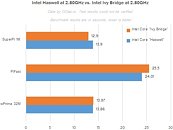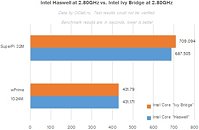- Joined
- Oct 9, 2007
- Messages
- 47,677 (7.43/day)
- Location
- Dublin, Ireland
| System Name | RBMK-1000 |
|---|---|
| Processor | AMD Ryzen 7 5700G |
| Motherboard | Gigabyte B550 AORUS Elite V2 |
| Cooling | DeepCool Gammax L240 V2 |
| Memory | 2x 16GB DDR4-3200 |
| Video Card(s) | Galax RTX 4070 Ti EX |
| Storage | Samsung 990 1TB |
| Display(s) | BenQ 1440p 60 Hz 27-inch |
| Case | Corsair Carbide 100R |
| Audio Device(s) | ASUS SupremeFX S1220A |
| Power Supply | Cooler Master MWE Gold 650W |
| Mouse | ASUS ROG Strix Impact |
| Keyboard | Gamdias Hermes E2 |
| Software | Windows 11 Pro |
Russian tech publication OCLab.ru, which claims access to Intel's next-generation Core "Haswell" processor engineering-sample (and an LGA1150 8-series motherboard!), wasted no time in running a quick clock-for-clock performance comparison with the current Core "Ivy Bridge" processor. In its comparison, it set both chips to run at a fixed 2.80 GHz clock speed (by disabling Turbo Boost, C1E, and EIST), indicating that the ES OCLab is in possession of doesn't go beyond that frequency.
The two chips were put through SuperPi 1M, PiFast, and wPrime 32M. The Core "Haswell" chip is only marginally faster than Ivy Bridge, in fact slower in one test. In its next battery of tests, the reviewer stepped up iterations (load), putting the chips through single-threaded SuperPi 32M, and multi-threaded wPrime 1024M. While wPrime performance is nearly identical between the two chips, Haswell crunched SuperPi 32M about 3 percent quicker than Ivy Bridge. It's still to early to take a call on CPU performance percentage difference between the two architectures. Intel's Core "Haswell" processors launch in the first week of June.


View at TechPowerUp Main Site
The two chips were put through SuperPi 1M, PiFast, and wPrime 32M. The Core "Haswell" chip is only marginally faster than Ivy Bridge, in fact slower in one test. In its next battery of tests, the reviewer stepped up iterations (load), putting the chips through single-threaded SuperPi 32M, and multi-threaded wPrime 1024M. While wPrime performance is nearly identical between the two chips, Haswell crunched SuperPi 32M about 3 percent quicker than Ivy Bridge. It's still to early to take a call on CPU performance percentage difference between the two architectures. Intel's Core "Haswell" processors launch in the first week of June.


View at TechPowerUp Main Site







